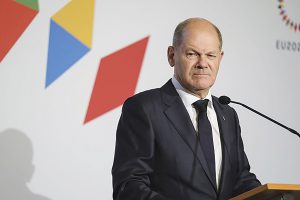The gathering tsunami of soaring energy costs finally forced Germany to act to quiet the grousing from the rest of the European Union.
Chancellor Olaf Scholz is ready to drop his opposition to joint borrowing at the EU level to cushion the blow of the crisis, Bloomberg News reports. While this doesn’t look like a “Hamiltonian leap†toward federalized debt that some enthusiasts hoped for during the Covid-19 crisis — when a reticent Berlin gave the nod to an unprecedented €724 billion ($702.5 billion) recovery fund that offered grants — it’s a positive step. Italian debt rallied on the news, while the euro pared losses.
The reported structure looks closer to the so-called SURE program, which offered loans rather than grants of up to €100 billion for worker support during the pandemic, rather than the taboo-busting recovery money that’s still being disbursed to the likes of Italy provided reform and investment pledges are met. In August, Scholz openly praised SURE as a “pragmatic†solution that had helped more than 30 million Europeans.
What makes this such a big U-turn is that Germany has resisted the idea for months, implying it wasn’t warranted — even in the face of an outcry from the rest of the EU over its own domestic energy-aid plan of up to €200 billion. The plan’s huge size, coupled with Berlin’s “nein†all year to more ambitious burden-sharing, led European Commissioners Thierry Breton and Paolo Gentiloni to warn such beggar-thy-neighbor moves could undermine EU solidarity and unity. Hungarian Prime Minister Viktor Orban, rather less tastefully, called it “ cannibalism.â€
It also reflects a need to find urgent solutions in the face of Vladimir Putin’s escalating war and natural-gas shutoff as a painful recession looms. Seven months into Russia’s invasion of Ukraine, and despite the surprising unity on sanctions, EU leaders have singularly failed to cover themselves in glory in unlocking financial support to cushion the fallout at home. Leaders’ summits have come and gone with plenty of ideas — such as capping the price of gas — but few specifics. With citizens increasingly expected to do their part in turning down the thermostat and cutting energy demand, and with corporate bankruptcies on the rise, the cost of inaction is too high.
 The Gulf Time Newspaper One of the finest business newspapers in the UAE brought to you by our professional writers and editors.
The Gulf Time Newspaper One of the finest business newspapers in the UAE brought to you by our professional writers and editors.
